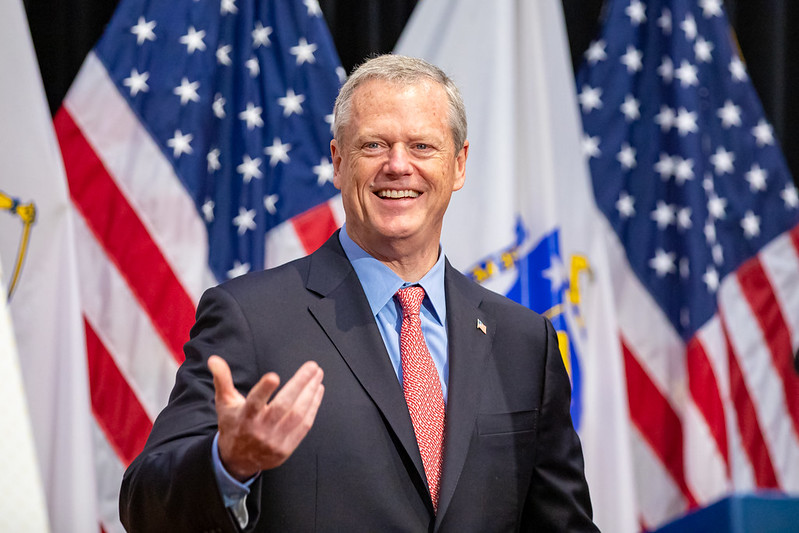In full transparency, the following was submitted to SOURCE media by the Governor’s office.
***
[broadstreet zone=”59945″] |
BOSTON – Today, July 20, Massachusetts Governor Charlie Baker testified virtually before the Joint Committee on Ways and Means and the House Committee on Federal Stimulus and Census Oversight in support of House Bill 3922, An Act relative to Immediate COVID Recovery Needs.
Governor Baker discussed his administration’s proposal to dedicate $2.9 billion in federal funding through the American Rescue Plan Act to jump-start the Commonwealth’s economic recovery and support residents hardest-hit by COVID-19, such as lower-wage workers and communities of color.
Remarks as prepared for delivery:
“Good morning Chairs Rodrigues and Friedman, Chairs Michlewitz and Hunt, and members of the Joint Committee on Ways & Means. Thank you for the opportunity to testify on H.3922, An Act Relative to Immediate COVID Recovery Needs.
“We filed this $2.9 billion proposal to put to immediate use part of the direct federal aid the Commonwealth has received under the American Rescue Plan Act. This would leave more than $2 billion available for other priorities.
“We appreciate that the Legislature set aside $200 million for the Administration to have access to flexible funds to support some immediate priorities. This week, we announced plans for investing $186 million of that funding in workforce training, hospitals, mental health, and health and human services. These are some of the most time sensitive needs facing the Commonwealth as we recover from the pandemic.
[broadstreet zone=”59946″] |
“As you know, the COVID-19 pandemic has touched every resident of the Commonwealth. But we know that certain communities, especially communities of color, disproportionately felt the impact of the virus.
“COVID also exacerbated longstanding issues facing these communities – like housing stability.
“As we look to invest these direct funds, we have a tremendous opportunity in front of us to address the disparities too many in the Commonwealth face.
“Massachusetts’ economic recovery is underway – with our nation-leading vaccination effort allowing us to reopen our economy. For the first time in over a year, our unemployment rate is below the national average.
“While we’re making progress on getting back to normal, now is not the time to slow down.
“We need to build on the momentum already underway and ensure recovery efforts are reaching all residents of the Commonwealth.
“The Commonwealth’s economic recovery plan must continue to include a focus on equitable recovery for every community.
“Many city and town officials are anxious to work with state government to put their federal resources together with ours to do transformational work in their communities.
“Some of these initiatives will take a while to implement, which is why we need to start now. As you know, there is a ticking clock on how long we have to spend these resources. Others can address immediate issues that do damage to our residents and our Commonwealth. This is why a significant part of our plan focuses on turbo-charging investments into existing programs with a proven record of success.
“The programs we propose to fund should be familiar to our colleagues in the Legislature – and we have been proud to work with you all in the past to fund and implement them.
“We included programs we all know are efficient and effective.
[broadstreet zone=”59982″] |
“And we prioritized funding initiatives that are aimed at helping communities of color and those hardest hit by the pandemic.
“From stakeholder engagement, we know that these programs work, and they are the ones that most positively impact communities that have been excluded from economic opportunity. The Lt. Governor and I have visited many of these projects over the past several years, many times with members of the Legislature in attendance, and have seen firsthand the impact that they are having.
“Critically, our proposal would not spend all of the available direct federal aid, leaving more than $2 billion, which can be invested in other key priorities in the months and years ahead.
“The programs I am proposing to fund need to be scaled up quickly to meet the urgent needs of our communities, as well as federal funding requirements.
“COVID made it clear that more work is needed to address the lack of housing of all kinds across the Commonwealth.
“Massachusetts has the sixth-largest racial homeownership gap in the United States. Historically, many families in communities of color have been zoned out, priced out, or simply zeroed out of the home ownership programs offered by state and federal governments, and therefore denied the opportunity to build wealth through homeownership.
“Our recently commissioned Future of Work report found that the cost of housing and continued challenges around equity will continue to be issues, with the Commonwealth needing between 125,000-200,000 new housing units by 2030.
“Our plan dedicates $1 billion to fund homeownership and housing priorities to increase housing production and to reduce barriers to owning a home.

“To expand these opportunities, we are proposing $300 million for programs focused on first-time homebuyers who reside in disproportionately impacted communities with down-payment assistance, mortgage insurance and mortgage rate buydowns. This program has the potential to create tens of thousands of first-time homeowners, making it possible for people to avoid being pushed out of their neighborhoods as demand outstrips supply and rents continue to rise.
“We are proposing an additional $200 million for MassHousing’s CommonWealth Builder Program, which promotes homeownership among residents of disproportionately impacted communities. Combined with $60 million of currently available funding, this investment will produce over 2,100 units of new housing.
“These initiatives will help promote intergenerational wealth and make a significant impact in addressing the homeownership gap in Massachusetts.
“We are also proposing $200 million to fund rental housing production – using existing programs that we have all supported before, and $300 million to finance statewide production of senior and veteran housing – again using proven models.
“Building off existing resources, these funds can support an increase of up to 50% more units through the Affordable Housing Rental Round process over the next five years, and these federal funds can help free up state funding with less restrictive eligibility requirements to go to other parts of the state.
[broadstreet zone=”59948″] |
“There are currently about 175 projects in the rental pipeline whose sponsors are expected to apply for funds during the next three months to two years, so we know there is an immediate pipeline of projects ready to be funded.
“Through our ARPA proposal, several thousand new units of housing can be built in the coming years.
“But that requires that we get started now.
“As an example, the CommonWealth Builder program was launched in July 2019, and we just cut the ribbon on the first completed project this June in Haverhill – two years later.
“Housing projects require a long lead time – with extensive planning needed to take a project from start to finish. But the need is clearly there – there are currently many projects in the pipeline that we would be able to fund if we had the resources.
“Our administration’s bill also includes $450 million to promote economic growth in all corners of the Commonwealth.
“The Future of Work report found that downtowns will need to adapt to changing workforce patterns as we recover from the pandemic – with the center of gravity for economic activity moving away from some urban centers.
“Our funding recommendations address needed investments to support economic growth in downtowns in all regions.
[broadstreet zone=”58610″] |
“$100 million would be provided for downtown development in cities and towns that were the most impacted by COVID-19. This funding would build on existing programs, like MassDevelopments’s Transformative Development Initiative, and would support a variety of investments such as planning support and recovery partnerships.
“We propose to invest $250 million for regional collaboration aimed at invigorating downtowns and town centers throughout the Commonwealth, including small towns and rural communities.
“These downtown funds could be spent through programs you and your communities are all very familiar with, such as MassWorks and the Shared Streets program. We have all witnessed how efficient and productive these programs are, which is why we included them as part of our overall plan.
“Right now we have about $300 million of funding requests for similar community development programs – and we currently only have the capacity to fund about one-third of those. The increased resources in this bill will help significantly expand our capacity to support recovery in downtowns across the entire Commonwealth.
“The Commonwealth’s tourism industry was significantly impacted by the pandemic. To support cultural facilities and tourism assets, this bill includes $100 million. We have worked together for years to support modest capital investments in cultural assets and annual investments in tourism efforts across the Commonwealth. But this community, more than many others, has been slammed by the pandemic. A significant investment in these areas, again, using existing program models, will help them kickstart their summer and fall seasons, and do the work many need to do to attract visitors and customers, and restore their brands.

“As we build back the economy, we must focus on ensuring every community can share in this growth.
“More than 350,000 residents are due to lose their enhanced unemployment benefits in the first week of September.
“We’ve been making investments throughout the pandemic to help get people back to work, but as we near the fall, it’s more urgent than ever that we have increased supports in place to help retrain people and connect them with jobs.
“Our Future of Work report found that between 300,000-400,000 people may need to transition to different occupations over the next decade as trends like automation and e-commerce accelerate and displace certain types of jobs. Senator Lesser and Representative Cutler are very familiar with this through their work on the Legislature’s Future of Work Commission. It is critical that we expand workforce training to connect workers with the skills that are needed for the future economy.
“Our bill proposes $240 million to fund a series of proven workforce development programs, which would immediately impact tens of thousands of workers.
“These funds will go towards programming across various areas including vocational schools, community based organizations and higher education institutions.
[broadstreet zone=”59984″] |
“This includes $150 million to help train and provide industry credentials to unemployed or underemployed individuals. These credentials will be in critical areas of our economy like advanced manufacturing, health care, information technology and construction.
“Programs that would be funded through this investment include Career Technical Institutes, apprenticeship programs, rapid reemployment grants and the Workforce Competitive Trust Fund Program.
“I know these programs in particular are very familiar to our colleagues in the Legislature – and we are grateful for the Legislature’s increasing funding for CTI in this year’s budget to $17.9 million.
“The bill also includes $35 million to fund English for Speakers of Other Languages programs and Adult Basic Education and $25 million for work readiness and essential skill programs. These are proven programs with long track records of success, and for those who need to change careers, because the job they had is simply gone, these programs are a fundamental building block to a different job in a different industry.
“The Commonwealth has made progress in gaining back jobs lost over the last 16 months, but there are still too many people who have been laid off or unable to work due to the pandemic.
[broadstreet zone=”59983″] |
“We know that many of the jobs lost during the pandemic will not be coming back – and we need to focus on efforts to retrain and reskill workers to meet the needs of tomorrow. We include a recommendation for system improvements in this space, so that we can assure that the job training resources we offer meet the need.
“These investments need to happen quickly to help people get back to work and keep the economy’s recovery on track.
“Our bill includes $50 million for fiscally stressed hospitals in disproportionately impacted communities. These acute care hospitals are in communities that experienced a significant number of cases and hospitalizations. These hospitals are generally community hospitals, serve a disproportionate number of individuals without insurance and are high Medicaid acute hospitals. They supported their communities throughout the pandemic, including community testing and vaccine administration despite interruptions to their revenue streams.
“During the pandemic, we’ve also unfortunately seen an increase in overdose deaths, psychiatric emergency room boarding and the demand for behavioral health services. To address these urgent needs, we are proposing a $175 million investment which will provide critical stabilization services to address urgent workforce shortages and expand mental health and addiction services, including increasing residential, clinical services and appropriate alternatives to emergency department boarding.
“We have proposed $1 billion in infrastructure investments across the Commonwealth, including $900 million for environmental and energy initiatives.
“Our plan includes $400 million to modernize water and sewer infrastructure, administered through the Clean Water Trust. The Clean Water Trust had already been in business for years when I served in state government in the 1990s. It works and works well. Its only limitation over time has been resources. And now, more than ever, water and sewer projects are a priority for local governments and boards of health. This funding will ensure consistency in service for public health and safety, environmental protection, and improved water quality resources.

“In the last fiscal year alone, the Trust received requests for $1 billion in funding for clean water projects, but only had the budget to award $620 million. And there’s a similar need for critical drinking water projects – with the Trust receiving more than $450 million in requests, but they only had the budget to award $195 million in funding. More than half of the projects seeking funding had to be turned away.
“One example of a major effort we could undertake with this funding is sewer separation projects in the Merrimack Valley – which would create separate pipes for untreated sewage and stormwater runoff to prevent combined sewer overflows into local bodies of water during periods of heavy rainfall. These last few weeks of endless rain have demonstrated just how critical it is to address this issue and address it now.
“In addition to CSOs, our plan would address other priority efforts with respect to drinking water, including PFAS and the removal of lead service lines. The Drinking Water State Revolving Fund recently started supporting PFAS remediation projects, but to do so it needed to pull nearly 60% of the program’s funding from other types of projects. This plan would direct a significant source of funding toward this critical public health effort.
“We also proposed $300 million to support climate resilient infrastructure. This funding would be distributed through programs like the Municipal Vulnerability Preparedness Program, Coastal Resilience Grant Program, and existing land conservation and parks programs under the Resilient Lands Initiative. Again, these programs have been blessed by the Legislature and have proven their worth.
[broadstreet zone=”59947″] |
“This funding could replace failing municipal culverts and coastal infrastructure across the Commonwealth.
“For example, the MVP program was only able to fund two-thirds of requests in its latest funding round.
“Across the Commonwealth, there are more than 25,000 culverts and small bridges – most constructed over 70 years ago. Just this past weekend, we saw the critical role these culverts play during heavy rain events. Three communities, Erving, Hadley and Orange, have seen culverts completely destroyed just from this weekend’s storms alone. Replacement costs, on average, are approximately $1 million per project. Finite capital resources can only address a handful (approximately 25) of these projects at a time and, for communities of this size, a single lost culvert will have a devastating impact on the towns’ finances for years to come.
“There are over 1,400 state-regulated dams across Massachusetts, with 198 classified significant/high hazard structures that are in poor or unsafe condition. Of the 198 dams, only 13 are currently being addressed. With current resources, only 8-10 dams can be addressed every 3-5 years.
“At the local level there are over 1,100 municipally owned coastal structures in 62 coastal communities that need significant funding to bring these deficient structures back to their operational levels.
“Adaptation investments are needed now. We see the impacts of climate change in our communities every day.
“One of the bright spots of the pandemic was that so many residents got outside to utilize our state parks. Many state parks saw record visitation last year, and we expect this demand will only grow in the years to come. We are proposing $100 million to support investments in public lands and public access. This will allow children and families, particularly those in underserved communities, to have equitable access to nature and recreation opportunities.
“Last fiscal year – over 100 projects requesting assistance with park and trail creation and restoration, and land acquisition were not able to be funded – representing almost 40% of requests.
“Our proposal could help improve facilities at DCR beaches and pools across the metro Boston area. We could construct and improve walking paths to parks in Gateway Cities to improve access.
“To support economic development and the offshore wind industry, our bill includes $100 million for marine port development. Funding would be used to rehabilitate or expand port areas across the Commonwealth, particularly those in environmental justice communities, including in New Bedford, Salem and Somerset.
“I said earlier that “our cities and towns can’t wait.” Here’s why.
“As you well know, the COVID-19 pandemic has required swift action to respond to complex challenges that threatened our health, safety, and economy, especially for some of our most vulnerable populations. 2020 was full of these moments, as we worked together to address the immediate needs of our constituents facing the pandemic.
“Time was not our friend then. And it continues to be a significant obstacle. As you have heard, the kinds of projects that are needed to address the impacts of COVID are significant in scale and time consuming. We have to start making the investments I proposed now, not months from now.

“The $186 million in ARPA funding we announced yesterday will help go towards addressing some of these concerns. But there is more work to do.
“Some of these programs, especially housing and infrastructure projects, require a long implementation time.
“For others, time is of the essence to address urgent needs.
“As I mentioned earlier, in early September, more than 350,000 residents will lose enhanced unemployment benefits. We need to make investments now to help people who have been laid off or unable to work find employment.
“We’re in the peak of tourism season – and after a tough year, our cultural institutions are best positioned now to make investments to take advantage of funding to boost their operations.
“And tragically, the pandemic has also made it clear that further investments in addiction services and behavioral health services are urgently needed.
“A delayed response will only exacerbate the issues that the pandemic laid bare.
“By delaying getting these funds out to those who need it most, we are doing a disservice to the people of Massachusetts.
“I appreciate the Legislature’s interest in pursuing a deliberative process for distributing these funds, which is why I signed the legislation you enacted to move the ARPA direct aid into a separate fund requiring appropriation. That is also why I have not proposed to spend all of the dollars in that fund. I recognize the need to act in partnership, as we have done throughout the pandemic.
“But the priorities we have laid out in this bill – housing production, addiction services, job training, downtown investments – are areas that we can all agree require urgent attention. As we have done over the past year and a half, we must act with speed and certainty.
“We cannot let this opportunity pass us by to make these investments now.
“Too many people have seen the impacts of this pandemic firsthand and need support.
“The family who has seen their daughter relapse during the pandemic.
“The worker who was laid off and is looking for a job training program.
“The shop owner downtown who isn’t seeing the same foot traffic as before the pandemic.
“These funds can be a game changer for people and communities that are struggling.
“We have a once in a generation opportunity to make a difference in the trajectory of many peoples’ lives with this funding.
“These investments are needed now. There are proven programs that work, that can scale up quickly, and deploy these resources to the residents that need them most.
“I am confident that you will agree these are urgent priorities and am hopeful that the Legislature acts swiftly on this proposal.


